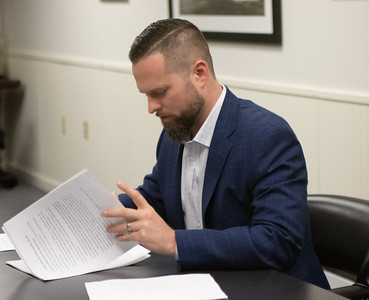Catholic Estate Planning Lawyer East Greenwich, RI

As a Catholic estate planning attorney, Geoffrey M. Aptt of Aptt Law LLC understands that your estate plan is more than just legal documents-it is a reflection of your faith, values, and commitment to providing for your loved ones. Catholic estate planning for families and individuals goes beyond asset protection; it is about ensuring that your legacy aligns with your moral and religious beliefs.
Whether you want to incorporate charitable giving to organizations, Catholic or otherwise, ensure your healthcare directives respect Church teachings, or create a trust that instills Catholic values in future generations, Attorney Geoffrey M. Aptt of Aptt Law LLC is here to guide you with faith-centered legal counsel. His approach integrates both sound legal strategies and Catholic principles, giving you peace of mind that your estate plan honors your faith while securing your family’s future.
Let Aptt Law LLC help you create a plan that reflects your devotion, protects your loved ones, and upholds the principles that matter most to you. Our RI Catholic estate planning attorney is available to get started working for you today; reach out to schedule a consultation now.

Estate Planning Tools For Catholic Families
Estate planning isn’t just about distributing assets-it’s about leaving a legacy that reflects your values and faith. For Catholic families, the process involves making sure that your estate plan aligns with Catholic teachings, supports the Church, and provides for the spiritual well-being of future generations. Working with our East Greenwich, RI Catholic estate planning lawyer can help you craft a plan that reflects these priorities while addressing practical needs like guardianship and asset protection.
Creating A Will That Reflects Your Faith
A will is one of the most essential tools in any estate plan, and for Catholic families, it provides the opportunity to reflect your values in your final wishes. In your will, you can appoint a guardian for your children, making sure that they are raised in the Catholic faith. If there are specific religious traditions or values you want to pass on, your will is an ideal place to specify those, helping to guide your family spiritually long after you’re gone.
Moreover, a will allows you to designate charitable bequests to the Church or Catholic organizations. Whether it’s a specific amount of money or assets intended to support a Catholic charity, diocesan fund, or Catholic school, you can directly support causes that align with your beliefs. Our Catholic estate planning attorney can help you structure these gifts so that they are carried out as intended.
Ensuring Your Wishes for a Catholic Mass are Fulfilled
By specifying your desire for a Catholic funeral Mass in your will, trust, or other estate planning documents, you provide clear direction to your loved ones and avoid uncertainty regarding your final wishes. If you have a specific church where you would like your funeral Mass to take place or specific clergy members you would like to officiate your Mass, this can be noted in your estate plan. Your estate plan can also set aside funds specifically to cover the costs associated with a Catholic funeral, including the church, priest honorarium, musicians, and burial expenses. This can be done through a designated bank account, a payable-on-death account, or within your trust provisions.
Some Catholics wish to have Gregorian Masses said for the repose of their soul. These are a series of 30 Masses traditionally said over 30 consecutive days. Your estate plan can direct a specific donation to a religious order or parish to ensure this request is fulfilled.
You may wish to include preferences for scripture readings, hymns, or other elements of your funeral liturgy. While these are often arranged with the parish at the time of passing, providing guidance in your estate plan can help ensure your funeral reflects your faith and personal devotion.
Trusts To Protect Your Family And Faith Legacy
Trusts offer an additional layer of protection and control over your assets. For Catholic families, creating a trust can do more than just protect wealth-it can also provide for the long-term religious education of your children or grandchildren. You can set up a trust specifically for Catholic schooling or for funds that will benefit your family’s spiritual development.
Additionally, a trust can be an effective way to provide for the Church or religious institutions over time. A charitable remainder trust or a donor-advised fund can allow you to donate a portion of your estate to Catholic charities while still maintaining some level of control over the assets during your lifetime. These tools allow you to integrate charitable giving with your estate plan in a way that supports your faith and can provide tax benefits.
Healthcare Directives That Align With Catholic Beliefs
Another essential tool for Catholic families is a healthcare directive, which outlines your preferences for medical care in the event that you are unable to communicate those decisions yourself. Catholic teachings strongly influence decisions about end-of-life care, particularly regarding the use of life-sustaining treatments and organ donation.
A living will or advance directive is a way to specify that you wish to receive care in alignment with your Catholic faith. For example, the Catholic Church opposes euthanasia and physician-assisted suicide, so these directives can clarify that you wish to avoid any actions that would intentionally end your life. Similarly, Catholic beliefs on organ donation may guide your decision to donate organs for the benefit of others, provided it aligns with your understanding of Church doctrine.
By including a healthcare directive in your estate plan, you can make sure your end-of-life decisions are made in accordance with your values, sparing your family from having to make difficult choices during an already stressful time.
Catholic estate planning is about creating a legacy of faith, hope, and love for the generations to come. By using tools like wills, trusts, and healthcare directives, you can protect both your family and your spiritual values, allowing your wishes to be carried out in a way that honors your Catholic beliefs. Working with our East Greenwich Catholic estate planning lawyer at Aptt Law LLC helps you integrate these tools into a comprehensive plan that reflects your faith and provides peace of mind for you and your loved ones. Attorney Geoffrey M. Aptt, Esq. has been practicing law for over a decade and is committed to delivering personalized estate planning solutions. You never know what the future holds, protect your family now by calling to schedule a consultation.
Catholic Estate Planning FAQs
Planning ahead matters for every family, but for those of us who practice the Catholic faith, shaping an estate plan that reflects Church teachings brings added meaning and purpose. Catholic estate planning includes spiritual, moral, and charitable priorities along with practical legal decisions. We often receive questions from individuals and families who want their estate plans to reflect their beliefs while also being legally sound. When working with an East Greenwich, RI estate planning lawyer, it’s possible to do both with care and clarity.
What Is Catholic Estate Planning?
Catholic estate planning refers to the process of preparing legal documents like wills, trusts, and healthcare directives in a way that complies with Catholic teachings. This includes being mindful about how assets are distributed, selecting decision-makers who respect the faith, and expressing final wishes in alignment with the Church’s views on life, death, and the dignity of the person. It may also involve planning for charitable giving to Catholic institutions or setting up structures that help continue a legacy of faith. Faith-based estate planning is not only about legal steps—it’s about making decisions grounded in values.
How Do I Create A Catholic Will?
To create a Catholic will, we begin with the same steps as any traditional estate plan, but we incorporate faith-based preferences along the way. That could include designating funds for Catholic charities, identifying burial preferences in line with Church teachings, and naming guardians who will raise children in the faith. We also discuss any spiritual intentions you want included in your final documents. A family-focused estate planning attorney with experience in religious planning will know how to translate these intentions into legally valid language.
Can I Include Catholic Values In My Estate Plan?
Yes, and that’s a key purpose of building an estate plan rooted in Catholic values. We can include written guidance that communicates the importance of sacraments, prayer, and Mass intentions. It’s also possible to provide moral guidelines to heirs regarding the use of inheritance or family business stewardship. Some clients include legacy letters expressing their hopes for how the next generation will live out the faith. When we work with an East Greenwich estate planning lawyer familiar with faith-driven planning, it’s easier to include these values in a meaningful way.
What Should A Catholic Consider When Choosing A Healthcare Proxy?
Choosing a healthcare proxy is one of the most personal parts of estate planning, especially when religion plays a role. For Catholic clients, it’s important to select someone who not only understands your medical preferences but also respects the Church’s stance on treatments, artificial life support, and the sanctity of life. We always suggest discussing these views with your proxy and including written guidance such as a Catholic advance directive. A Christian estate attorney can help align these documents with your intentions.
Are There Catholic Guidelines For End Of Life Decisions?
Yes, the Church provides clear moral direction when it comes to end of life decisions. Catholic teaching supports the use of ordinary care but does not require extraordinary means to prolong life if there is no reasonable hope of recovery. This might include avoiding euthanasia, declining aggressive interventions when burdens outweigh benefits, and receiving spiritual care such as the Anointing of the Sick. These decisions can be addressed in living wills or healthcare directives, which a faith-based trust and will attorney can help draft properly.
Carrying Your Faith Into The Future
Catholic estate planning goes beyond legal paperwork; it’s a way to pass on faith, values, and a sense of purpose. Working with an East Greenwich estate planning lawyer who respects those goals makes the process more meaningful. We’re here to help you build a plan that respects both your wishes and your beliefs. Attorneys like those at Aptt Law LLC understand how to provide legal support that reflects your values and can help guide the process from start to finish.
Disclaimer:
-
The Rhode Island Supreme Court licenses all lawyers in the general practice of law, but does not license or certify any lawyer as an expert or specialist in any field of practice. This web site is designed for general information only. The information presented at this site should not be construed to be formal legal advice, nor the formation of a lawyer client relationship.
-
No Attorney-Client Relationship Created by Use of this Website. Neither your receipt of information from this website, nor your use of this website to contact Aptt Law LLC (hereinafter “the Firm”) or one of its lawyers creates an attorney-client relationship between you and the Firm. You will become a client of the Firm only if and when you sign an engagement agreement setting forth the scope of the Firm’s engagement, the fee arrangement and other relevant matters.
-
Disclosure Under IRS Circular 230: Any U.S. federal tax advice contained in this communication (including any attachments) is not intended or written to be used, and cannot be used, for the purpose of (i) avoiding penalties under the Internal Revenue Code or (ii) promoting, marketing, or recommending to another party any tax-related transaction or matter.


